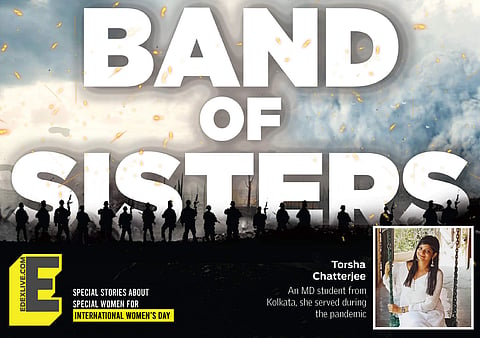

Despite putting in endless hours to serve people during the pandemic, frontline workers including medical students, had to face social discrimination. Torsha Chatterjee, a final-year MD student from Kolkata, had a similar experience. "We had to face a lot of social discrimination, a lot of our colleagues were asked to vacate their rented houses, flats because of the fear of the virus spreading," she tells us. But this did not stop them from doing their jobs.
Torsha shares that when COVID started it was something brand new for them, "something we weren't aware of at all. As doctors, we have dealt with numerous deadly diseases but this was not the same. The most challenging part of it was not knowing much about the virus during the initial days. The virus keeps on evolving and mutating and during the first few months, we as doctors didn't know what treatment would work, how much protective gear is enough, the intensity of the virus spread and so on. It was very scary for us as well."
Apart from that what became difficult was isolating themselves from their own families. "I stayed back in my college hostel during that time to decrease contact with my parents and older grandparents. However, some of my seniors, who are mothers to very young children, couldn't go home or even meet their children during those months. The children might have been completely dependent on their mothers, but these women couldn't even go close or hug their child, sometimes the kids could not even understand why," she adds.
She recalls how physically taxing the initial days were. "We had to put in extra hours, we had to be alert at all times. I was on duty in two of the government hospitals in Kolkata — Infectious Diseases and Beliaghata General Hospital, which was the hub for testing COVID-19 cases, and RG Kar Medical College, where I am pursuing my medical degree. We had a dearth of protective gear initially, we did not know how much protection we needed at a certain point. Later on, it got easier," she says.
Speaking about what their days looked like, Torsha adds, "Even when the number of cases wasn't high, we had to screen every patient coming into the hospitals to check for possible travel history and contact, all while maintaining proper distancing norms. Soon after that, when the numbers began to rise, we did not have enough beds. Lack of ICU beds, some patients couldn't be given ventilator beds during the peak time and it was really stressful at that point. Wearing the PPE kits were very difficult, it is recommended that you don't wear them for over six hours or so, it drains you of all minerals, dehydrates you, but given the dearth of protective equipment, we had to do that as well. The initial 2-3 months were difficult but later, kits were made available."
Torsha was also worried about her own family's well-being. "The thing that I was most scared of was infecting my parents. Even if I went home for some work, I used to wear my mask at all times. I have only been at home 4-5 times in the past year," she says. Speaking of the situation now, she concludes, "The wards are almost empty now. But the way people are taking things casually and not wearing masks, I'm sure the cases will increase again. It already is. I feel bad about the fact that people did not learn much even after all this."
